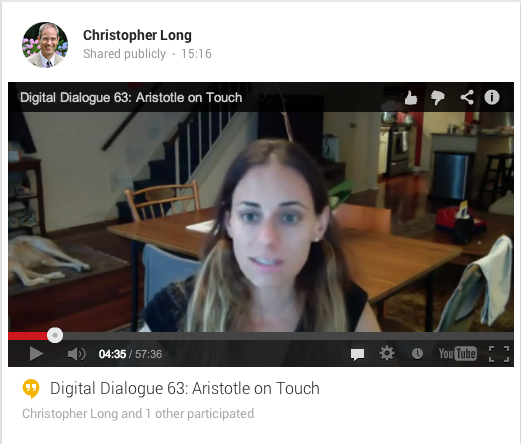
Rebecca Goldner, recent PhD from Villanova University, joined the Digital Dialogue for episode 63 on Touch in Aristotle. This was our first recorded Digital Dialogue using Google+ On Air, and we were able to stream it live during the discussion.
In the spring of 2013, Rebecca defended her dissertation at Villanova University entitled, Lived Flesh: Touch and Embodiment in Aristotle’s de Anima.
She also has an excellent article published on the topic in Epoché: A Journal in the History of Philosophy, entitled Touch and Flesh in Aristotle’s de Anima. It was a hearing of a version of this article at the Ancient Philosophy Society in 2010 and then a subsequent reading of it in Epoché that first brought Rebecca’s work to my attention. That paper informed my own forthcoming paper on touch in Aristotle, entitled On Touch and Life in the De Anima, a version of which I gave at the Collegium Phaenomenologicum in Italy in the summer of 2012.
Given these connections, we thought it only appropriate to continue our discussion of touch in Aristotle on the Digital Dialogue. In addition to the audio file, you can watch the conversation via YouTube, below:
I invite you to listen to the podcast below, and of course, to subscribe to the podcast using the orange button at the top of the sidebar on the right.


a most engaging dialogue. although this commenter lacks the learning to discern the worth and power of what the interlocutors had to say about aristotle on the subject, it was, nevertheless, gratifying to see a young scholar deeply engaged in the study of one of the greatest minds that the western civilization has produced. it was also gratifying to see the public service which Professor Long rendered by making a clear distinction between the naturalism of F. J. E. Woodbridge and John Herman Randall, Jr., on the one hand and on other that of atomism and materialism. the soul as something like the actualization of the body’s power to do what it can do, which woodbridge and randall made public in the US, following, it would seem, aristotle, has personally had a liberating effect, when much of contemporary thinking appears to be plagued by thinking either of the body and soul as two substances magically interacting or of having no soul at all. to me at least this making Nature the home of the soul is what defines american naturalism of woodbridge and randall.
http://anthem-group.net/2013/08/03/aristotle-on-touch-rebecca-goldner/
Thanks, Chuk, for this comment and for expanding on the importance of the naturalism of Woodbridge and Randall. It is a great pity they their position is not much discussed when the meaning of naturalism comes up, as evinced by this 2011 piece on naturalism in the Stone in the New York Times.
As you know, I take up their understanding of naturalism is great depth in Aristotle on the Nature of Truth.
it was in fact my brief possession of Aristotle on the Nature of Truth that first made me become a witness to your digital life – (i say “brief” because a friend “borrowed” it never to return, i need to get another a copy.) i look forward to reading both that and your forthcoming book on Plato. on plato, Professor CH Kahn’s splendid scholarship one can only cherish, but his reading of plato has been difficult fathom. still, there is much profound insight in anything he writes, and some of my friends, being convinced platonists, too appear to think that plato approached his writing with a fully developed philosophy in hand, and an otherworldly one at that, with a strategy to progressively reveal it. it is also difficult to believe that plato actually meant that philosophers should be kings. when we think of the founding fathers who probably founded the greatest nation on earth, they were clearly men of immense practical wisdom, but no one would accuse them of theoretical wisdom. ambition, or an ordinate desire for power or prestige or wealth does not appear to be compatible with life at a theoretical level. self-sufficiency of personality seems more conducive to the theoretical life than emotional neediness.